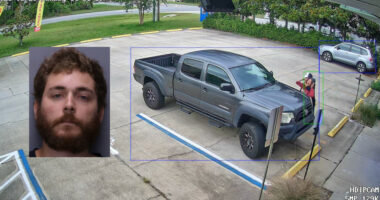
There was a tugging, invisible thread in Thursday’s Drug Court graduation at the Flagler County courthouse, like a thin line between the abyss and recovery.
The ceremony for four graduates took place in mid-morning in Courtroom 401. Circuit Judge Dawn Nichols presided. That courtroom was still being used for a trial that had gone on all week. But the jury had been deliberating for about an hour and a half by then. There was no way to tell how long it would go. Drug Court graduation had been scheduled in the same courtroom for weeks.
Improvising on the fly, Drug Court organizers figured they could squeeze in the ceremony in the same courtroom, the courtroom where the graduates appeared before their judge week after week as they endured the program. If the jury reached a verdict, the ceremony would be suspended. As it turned out, it didn’t have to be. The jury continued deliberating until early afternoon.
What the four graduates didn’t know, what the many Drug Court participants attending the ceremony did not know, is that the trial was of Brian Pirraglia, a 42-year-old man charged with murdering 39-year-old Brian O’Shea by injecting him a single shot of fentanyl.
What the Drug Court graduates and participants might not have wanted to know is that but for the grace of the court, any of them, graduates or participants, could have been either Pirraglia or O’Shea. Any of them could have been facing life in prison, or been dead by now: the jury a few hours later found Pirraglia guilty. Nichols sentenced him to prison for life. And O’Shea’s mother flew back to Pennsylvania with her son’s ashes in a small urn in her pocket.

Instead, four Drug Court participants–Jordan Ebbers, Hunter Watson, Kelly Wilder and Brenna Cronin–got to graduate very much alive, clean and sober, and more alive than they’d been when they’d entered Drug Court as substance abusers many months before. The numerous participants in the gallery, still struggling through the grueling steps of Drug Court, could and did applaud their classmates, hoping to be in their place at a coming graduation, earning their graduation certificate and “key to the future” from the presiding judge, as the four graduates did.
A few may not make it. A few may fail out, and maybe one of them might well end up in place of either Brians. But most will graduate, though hearing about the trial it might have been an added motivation to earn that certificate. No one thought of mentioning it. Nichols certainly couldn’t have. It wouldn’t have been proper.
As it was, Nichols did not lead most of the ceremony. She deferred to Terrence Perkins, the former judge who retired seven weeks ago, and on whose watch the Drug Court graduates had taken most of their steps away from their former life. Perkins never mentioned the Pirraglia trial, but most of what he said–most of what every speaker said, including the graduates–could have applied to Pirraglia or O’Shea.
“What we’ve asked you to do is change everything,” Perkins told the graduates. “Change the people that you associate with, change what you do, change what your goals and aspirations are, and the hope is in this process that we can keep you straight, sober and committed to recovery for a long enough period of time. Then you start to remember who you are and what your aspirations and goals are, and that’s what leads you here today.” He described how drug court participants, the graduates especially, typically look physically different, sometimes very different, by the time they graduate–in better. It’s usually a sign of success.

Perkins presented the certificates and the key to each of the four graduates, briefly describing the trajectory each took through Drug Court to get to this point. It is rarely a straight line. There are setbacks, failures, struggles, all of which Drug Court disciplines rather than accommodates, at times harshly, and always with those hounding urinalyses. He then gave each a chance to say a few words. One of them simply thanked everyone and went back to his seat. Another said: “I thought drugs were going to solve my problems, but really made a problem.” She was happy to be done with UAs, as participants refer to urinalyses.
Perkins left Brenna Cronin for last: she had a poem to share (“the drugs are freaking out in my brain/ I look at her. She looks at me/ the mirror’s lying. I can’t stop crying/ when I finally come to see/ I’m all alone, just feeling gone/ an empty shell resembling who I used to be”) and she looked back at how she lost custody of her children. “At one point, I thought it didn’t matter if I used and just pretty much killed myself, because I had nothing left,” she said. She credits the Smart program at the Flagler County jail for turning her around, and more especially Danielle Moye-Auriemma, a volunteer from OARS (Open Arms Recovery Service of Flagler County) who runs the program. The two had met in rehab. (The jail’s Chief Daniel Engert was also in the audience.)
All graduations are emotional. Drug Court graduations are more profoundly so because those ceremonies alone recreate the story of Lazarus, without the mythological fabrications: the graduates themselves–whose criminal charges are dropped as a result of their successful completion of the program–speak of the experience as a form of return from the dead. “The person I am now is the polar opposite of who I was when I came here two years ago,” Cronin said. “I can honestly say that this program is one of the best things I’ve ever done. And if not for this program, I would not be the person I am today.”
Michael Feldbauer, president of the Flagler County Drug Court Foundation, the non-profit, support arm of the judicial program (which, among other things, sponsors these graduations), said seeing graduation’s successes is what keeps the foundation–and the program–going. “This isn’t the end of anything. This is the beginning. Today starts the next part of your life,” Feldbauer said. The other word for graduation, after all, is commencement: literally, the beginning. He urged the graduates to stay connected. “We’re not only here while you’re in the program, but we’re here for as long as you’re out there and might need one of us.” He reminded them: “This works when you want it. You need to want it. You need to see that the changes in your own life that make a difference.”

Perkins did not sideline Nichols. He took the occasion to tell the audience that he was “very much involved in selecting judge Nichols” to replace him, insistently being in Chief Judge Leah Case’s ear since Case made the final decision. “She has experience in criminal law, family law, civil law, even more civil law now and in running a drug court program successfully,” Perkins said of Nichols. “The other side of it, though, was that she has a huge heart, a big heart. She is as committed to your success as you are now. Does that mean that she won’t look at you objectively and do what needs to be done to move you forward, to get you to the finish line, to get you to graduation? Of course, she’ll do all of those things. But she has a huge heart, which I think is so important for Drug Court, and so it’s a big change, and I think it’s a it’s a good change in that regard.”
Perkins was as if saying that he had perhaps been harsher–a distinction unlikely to be disputed. His harshness was neither blind nor unforgiving. But no one could doubt his commitment to punishment.
The ceremony and a few pictures over, it was time for the participants to head downstairs for their celebratory pizza and sandwiches, and for 401 to revert to the more cryptic silence of a courtroom awaiting a jury’s verdict, and to the disbelief, and the sobs, and the life sentence that would soon follow.







